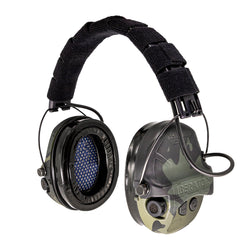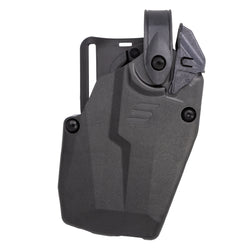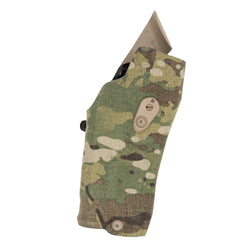Some gun owners love to push the limits of their firearms, boasting about how many rounds they’ve fired without cleaning. It’s almost like they’re trying to break a record. But this is like driving your car for thousands of miles without ever changing the oil. Sure, you might get away with it for a while, but eventually, the lack of maintenance will catch up with you.
A firearm is a finely tuned machine with moving parts, and where there is metal-on-metal contact, lubrication and maintenance are essential. While it’s tempting to see how long your handgun will keep running without proper cleaning, the reality is that regular maintenance will keep your firearm functioning properly, extend its life, and ensure reliability when you need it most.
This article covers the why, when, and how of cleaning your handgun. We’ll talk about the reasons behind cleaning your firearm, the steps to do it, and the best tools and lubricants to use to make sure your gun stays in top shape.
Let’s get started.
Why Clean Your Handgun?
A handgun is a complex machine with metal parts rubbing against each other whenever it’s fired. This friction generates heat, causes wear, and can lead to malfunctions over time if not properly addressed.
When you fire a round, the cartridge ignites, which sends the bullet down the barrel. This explosion releases gas, powder residue, carbon, and sometimes unburnt powder particles. All these elements end up inside your gun’s action, barrel, and other components, building up as fouling and making your firearm dirty.

Beyond the mess, that residue has a real impact on the performance of your gun. Dirt and carbon buildup can cause malfunctions, jams, and even failures to fire. Over time, this can lead to degraded accuracy and reliability — two things you don’t want in a defensive or competition firearm.
Regular cleaning helps remove this buildup and ensures that your handgun runs smoothly.
But what happens if you don’t clean your handgun? Over time, the fouling can mix with oil and other lubricants, creating a gunky paste that can cause jams and misfeeds. In humid environments, rust can develop, causing pitting on metal surfaces.
This residue doesn’t just make a mess — it impacts performance. Dirt and carbon buildup can cause malfunctions, jams, and even failures to fire, ultimately degrading accuracy and reliability, which are critical in defensive or competition firearms. Regular cleaning helps remove this buildup and prolongs the life of your gun, ensuring it stays reliable and ready to perform when you need it most.
How to Clean Your Handgun
Cleaning a handgun can seem intimidating at first, but once you’ve done it a few times, it becomes second nature. Here’s a step-by-step guide to get your handgun properly cleaned and maintained:
Make Sure the Gun is Unloaded! Safety first. Always check to ensure your handgun is unloaded before beginning the cleaning process. Remove the magazine and check the chamber to confirm it’s empty.
Disassemble the Handgun
Refer to your firearm’s manual for disassembly instructions. Most modern handguns break down into four main parts: the frame, the slide, the barrel, and the recoil spring assembly. Breaking the gun down this way allows you to clean each individual component thoroughly.
Clean the Barrel
Start by running a bore brush through the barrel with a patch soaked in gun cleaner or solvent. This will dissolve the carbon and fouling. Once the barrel is clean, run dry patches through until they come out clean and dry. Finally, apply a light coating of oil to protect the barrel from rust.

Clean the Frame and Slide
Use a nylon brush or an old toothbrush to scrub the inside of the frame and slide. Pay close attention to areas where grime and fouling tend to build up, like the rails and the breech face. Wipe down these parts with a clean cloth.
You do not always have to use a solvent for this part. Unless there is a lot of carbon build-up, I often use a cleaner like SLIPS 2000 to clean the parts before re-oiling them.

Lubricate Key Components
After everything is clean, it’s time to apply some oil. It doesn’t take much, and it only needs to be applied to key areas where metal parts move against each other. This includes the rails, the barrel lugs, and the trigger components. A little goes a long way here — over-oiling can attract dirt and cause problems.
Reassemble the Handgun
Once everything is clean and lubricated, reassemble your handgun. Make sure to function check the firearm to ensure everything works as it should, such as the trigger, slide, and magazine release.
Finally, use a cloth to wipe down the outside of the gun with a light coat of lubricant to protect the finish and prevent rust.
Cleaning your handgun is a simple process but doing it regularly can extend the life of your firearm and ensure that it’s always ready to perform when you need it. Wipe off the old oil, apply new. It’s like changing the oil in your car.
Favorite Firearm Lubricants and Cleaning Tools
Quality lubricants and tools make all the difference when it comes to cleaning your handgun. While you can get away with using basic supplies, investing in high-quality products will make the process easier and more effective.
Lubricants
When it comes to keeping your handgun running smoothly, good lubricant is important. Here are a few of the best options:

- Break Free Synthetic Gun Oil comes in a spray bottle that makes it easy to apply. It’s some of the best synthetic oil on the market.
- Wilson Combat Ultima-Lube II: Known for its excellent protection and longevity, Wilson Combat’s Ultima-Lube II is one I use a lot on my 1911 handguns, but it works great on any handgun.
- Lucas Extreme Duty Gun Oil: This stuff works great in high-heat environments. It’s perfect for firearms that see heavy use.
- Tru Blue Gun Oil: Tru Blue offers exceptional lubricity and rust prevention, making it a great choice. It’s 100% synthetic and is perfect for any firearm.
- Militec-1: This synthetic lubricant bonds to metal surfaces, providing excellent long-term lubrication and rust protection.
- Mobile One Synthetic Motor Oil: While it might sound strange, some gun owners swear by using synthetic motor oil for their firearms, as it provides excellent lubrication and is cost-effective. I have used it a great deal on my AR-15 rifles.
Cleaning Tools
A quality set of cleaning tools will make the job easier to make sure you’re able to properly clean your handgun. I have used a lot of different tools and brands over the years and Real Avid is among my favorite brands. Here are a few must-haves:
Cleaning Mat: A good mat helps keep everything organized and protects your work surface from solvents and oils. Again, I recommend the Real Avid cleaning mats, as they’re durable and include a schematic of popular firearms. This helps for those new to the disassembly and reassembly process.
Pick Cleaning Set: Sometimes dirt and debris hide in hard-to-reach places. A good set of cleaning picks lets you get into the nooks and crannies to remove fouling. I use these when I’m doing a deep clean of my firearm.

Bore Brushes: A bore brush is a must-have for scrubbing the inside of your barrel. Make sure to get the right size for your firearm.
Nylon Cleaning Brush: A nylon brush, or an old toothbrush, works wonders for scrubbing grime from your handgun’s slide and frame. This is probably my go-to tool for cleaning any firearm.
Bore Cloths and Patches: These are used to wipe down your barrel and other parts. They’re cheap, disposable, and essential.
Gun Cleaning Kits: If you want to keep things simple, consider purchasing a pre-made gun cleaning kit. These kits often include everything you need — solvent, oil, brushes, and patches, all in one convenient package. Real Avid makes general cleaning kits and kits for specific firearms. They are high-quality tools and well-organized cases.
Maintaining your handgun doesn’t have to be a chore, it just takes a little effort. Investing in quality cleaning tools will make the job faster, easier, and more effective. Keeping your firearm clean and well-lubricated will ensure it stays reliable, accurate, and ready for action.
Ready to clean?
Just like any machine, a handgun needs regular maintenance to function properly. Cleaning and lubricating your firearm will help to prevent malfunctions and provide a smooth operation. It also extends the life of the firearm.
Deciding how often to clean it may depend on how much you shoot, the type of ammo you’re shooting, etc. I like to break mine down and wipe the parts off with a clean rag and apply more oil every time I shoot it. After firing several hundred rounds through a gun, I do a more thorough cleaning.
Whether you shoot often or only occasionally, taking the time to clean your gun regularly is a small investment. It will pay off in time as it extends reliability and performance.
So, resist the urge to test the limits of how long you can go without cleaning. Instead, treat your gun like the finely tuned machine it is, and keep it running smoothly with regular care and maintenance.









